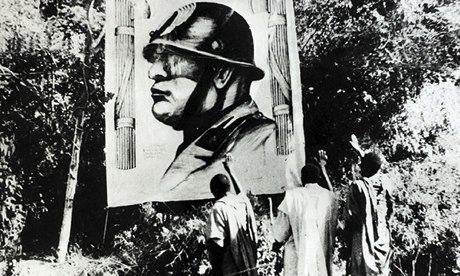Nelson Mandela was born into a continent colonised and in servitude to European powers. Only Ethiopia and Liberia were independent. But Germany's defeat in the first world war brought about a reworking of the colonial order with its possessions in what are now Tanzania, Cameroon, Togo, Burundi and Rwanda distributed among the war's victors – Britain, France and Belgium. German South West Africa, now Namibia, fell under South African control.
Mandela was a citizen of a new country: South Africa had been born eight years earlier with the unification of four British colonies, including the two former Afrikaner republics of the Transvaal and the Orange Free State, taken over after the Boer war. Ironically, the Boer struggle was widely seen as the first anti-colonial fight of the 20th century against the British empire.
 South Africa, because of its large white population, was a politically autonomous dominion under the British crown, unlike the UK's other African colonies. In 1918, some territories were still regarded as the private property of commercial companies. Southern Rhodesia, now Zimbabwe, was owned by the British South Africa Company and would not be recognised as a colony until 1923.
South Africa, because of its large white population, was a politically autonomous dominion under the British crown, unlike the UK's other African colonies. In 1918, some territories were still regarded as the private property of commercial companies. Southern Rhodesia, now Zimbabwe, was owned by the British South Africa Company and would not be recognised as a colony until 1923.
Ethiopia was one of only two independent countries in Africa when the Italian fascist dictator, Benito Mussolini, decided to expand his small "African empire". Italy invaded in 1936, overthrowing Emperor Haile Selassie and confirming the League of Nations as toothless in the face of fascist aggression. Ethiopia was integrated into Italian East Africa with Eritrea and Italian Somaliland.
From 1940, the desert war ranged across north Africa for three years, swinging from French Tunisia through Italian Libya to within striking distance of Cairo. That conflict once again remade the colonial map, with Italy forced to relinquish its rule of Libya and Somalia, and Ethiopia liberated in 1941. It was also deciding the future of imperial rule in less immediately evident ways. After the war, France recovered possession of Tunisia, where a sizeable expatriate population lived, but its authority was fatally undermined and it was independent within a few years, along with Morocco.
Newly demobilised African soldiers who served the allied cause in north and east Africa, Europe and Asia arrived home questioning the disconnect between the Allies' trumpeting of freedom with the continued subjugation of their own continent.
A smattering of well-educated anti-colonial leaders provided the arguments and the direction to draw increasingly restless Africans into the struggle for their freedom.

No comments:
Post a Comment